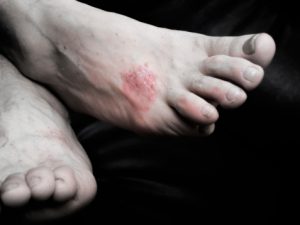 Psoriasis, a skin condition, has been linked to an increased risk of obesity and type 2 diabetes. Danish researchers found that individuals with type 2 diabetes had over 50 percent greater odds of developing psoriasis, compared to individuals without diabetes.
Psoriasis, a skin condition, has been linked to an increased risk of obesity and type 2 diabetes. Danish researchers found that individuals with type 2 diabetes had over 50 percent greater odds of developing psoriasis, compared to individuals without diabetes.
Furthermore, researchers found the rate of psoriasis rose as weight increased. For example, individuals with a body mass index over 35 had double the risk of psoriasis, compared to normal weight individuals.
Advertisement
Lead researcher Dr. Ann Sophie Lonnberg explained, “Psoriasis is a complex disorder. The genetic background for the disease and its many comorbidities [coexisting conditions] have not yet been fully uncovered.”
Although the study does not reveal a cause-and-effect relationship, it does uncover an association.
Lonnberg added, “The reason psoriasis and obesity are associated is not only due to a common lifestyle, but they are also associated due to common genes. It is important to treat psoriasis and obesity and diabetes, since they are risk factors for heart disease and could have serious effects on overall health.”
The researchers looked at data from nearly 34,000 twins. Just over four percent of individuals had psoriasis, slightly over one percent had diabetes, and just over six percent were obese.
Of those with diabetes, eight percent also had psoriasis, while among those without diabetes only four percent had psoriasis. Additionally, individuals with psoriasis were generally heavier.
Dr. Joel Gelfand, the author of the accompanying editorial, added, “Psoriasis is not just a disease of the skin – patients and health care professionals need to be aware of systemic health issues associated with psoriasis. Some of this risk may be due to shared genetics between psoriasis and diabetes. It is also thought that chronic inflammation in psoriasis may predispose patients to diabetes.”
“Patients with psoriasis who are overweight or obese may lower their risk of diabetes while making the skin disease less active if they are able to achieve and maintain a more healthy body weight,” Gelfand continued.
Advertisement
Dr. Doris Day, dermatologist, concluded, “I have seen that psoriasis is linked with diabetes, which suggests that a genetic link may help explain why it’s a lot harder to control diabetes in patients with psoriasis. We are understanding more about psoriasis and coming up with better treatments for it. If you have psoriasis, you need to see a dermatologist, a cardiologist, and an endocrinologist to make sure you have other conditions under control.”
Also, read Bel Marra Health’s article on That itch! Get to know the symptoms and causes of psoriasis.
Sources:
http://archderm.jamanetwork.com/article.aspx?articleid=2518351
